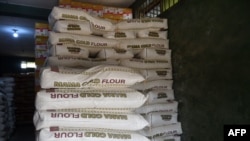U.N. officials warn that soaring prices of food, fuel, fertilizers, and other commodities due to the Russia-Ukraine war could have a profound destabilizing impact on the African continent.
Africa is still reeling from the socio-economic impact of the COVID-19 pandemic, which has plunged some 50 million people into extreme poverty. The continent is also tackling crises generated by climate change, conflict, and political unrest.
Added to this toxic mix is now the war in Ukraine.
Ahunna Eziakonwa, the U.N. Development Program’s assistant administrator and regional director for Africa, said Russia’s invasion of Ukraine is reverberating badly on the continent.
“Things that really was stunning for the continent and a rude awakening is how much it depends—almost 90% dependence on external sources of goods for what it needs to keep its population alive. Food and medicine," she said.
Eziakonwa said the impact of soaring inflation due to price hikes of food, fuel, fertilizer and other commodities will soon begin to bite. She said Africa’s reliance on imports of food and other goods from Russia and Ukraine will create another front of discontent and possibly unrest in a growing number of nations.
UNDP-Africa Senior Economist Raymond Gilpin said rising inflation is putting several large investments on hold across the continent. He cited as examples the development of a huge steel mill complex in Nigeria and fertilizer plants in Angola.
Golpin warned tensions are rising in hot spots such as the Sahel, parts of Central Africa, and the Horn of Africa as the Russia-Ukraine war begins to fester.
“Particularly in urban areas, low-income communities, which could spillover just to violent protests and … probably also violent riots,” he said. “Also, and countries that have elections scheduled for this year and next year are particularly vulnerable because this could become a trigger.”
UNDP officials are calling for global action to address the problems in Africa resulting from measures taken half a world away. They say the long-term consequences of this new global crisis pose great risks to peace and stability efforts on the continent.
These dangers, they note, come at a time when Sub-Saharan Africa accounts for nearly half of global deaths caused by terrorism as seen in the record number of coups last year.




